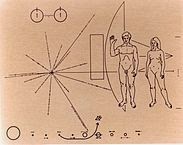
A recent not-very-good article in The Independent presents as news what is really an ongoing debate within the relatively small community of scientists interested in the search for extraterrestrial intelligence (SETI). The issue is whether or under what circumstances SETI should become “METI” — that is, Messages to Extraterrestrial Intelligence. We have been listening for messages; should we start deliberately broadcasting them?
 |
| Image via Wikimedia |
Actually, we have been doing this deliberately but hardly systematically for some decades now: think of the justly famous Pioneer plaques of 1972–73 and the Voyager Golden Record of 1977. David Brin, the noted science fiction author and admittedly a partisan of one side in this debate, provides an excellent background discussion, which I hope he will update again in light of the more recent events The Independent alludes to.
Like all discussions about SETI, the merits of this one depend heavily on our assumptions about the nature and existence of advanced extraterrestrial intelligence, a topic that reasonable people are very free to disagree on because we know absolutely nothing about it. For example, the whole question of sending messages to planetary systems that we have newly identified as good targets for having life at all (which discoveries seem to be spurring the current round of METI interest) presupposes not only that we have some solid understanding of all the conditions under which life can emerge. It also presupposes what some would regard as a rather old-fashioned SETI model of interplanetary communication between intelligences more or less advanced yet bound to their planets. For those transhumanists like Hans Moravec who see the future on our planet as artificial intelligences greedily transforming matter into computational substrates and spreading out in a wave of expansion traveling at not much less than the speed of light (think Borgs without bodies) the notion that we should just send messages over to other planets can only look quaint. Or if intelligent self-replicating nanomachines are in our future, then we may already be sending messages to ETI without even knowing it because such machines created by super-intelligent aliens may already be here among us. And so on. Transhumanist responses to SETI have shown how the sky is the limit when it comes to our imagination of not-implausible ETI scenarios (indeed, what defines “plausible”?). And imagination will be all we have to go on, until well after we have had some comprehensible first contact.
I admit to finding both sides of the METI debate unsatisfying. Those who advocate sending messages are counting either on a dogmatic belief in the benevolent nature of alien life or on the vastness of cosmic distances to act as a quarantine effect. These are both dubious assumptions; I discuss them critically at some length in my new book Eclipse of Man.
And there is certainly something to David Brin’s concern that the advocates of sending messages are taking a great deal on themselves by proceeding along these lines without a more thorough consideration of the merits of the case. Yet Brin’s own desire for international consultation, or, as he puts it on his website, getting “input from humanity’s best and wisest sages … while laying all the issues before a fascinated general public,” does not conform to the sensible reservations he expresses elsewhere about the wisdom of individuals and seems pretty thin gruel if indeed the fate of all of humanity is at stake. It is a wonderful thing “to open up broader, more eclectic and ecumenical discussions.” But we still have to wonder about their results, if indeed they reach any conclusions at all, when there is no framework of authority for actually shepherding such a discussion to a presumptively globally legitimate and enforceable conclusion — which is almost certainly just as well when you stop and think about the way so many of the global political institutions we do have actually work. We may not know anything about extraterrestrial intelligence, but we do know the answer to the question, “Who speaks for Earth?” So far: nobody, thank goodness.

